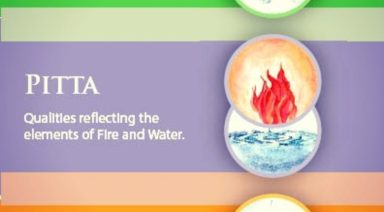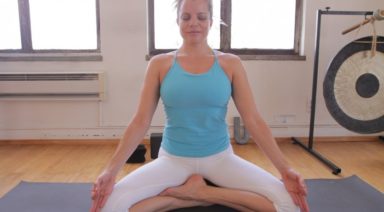What it Really Means to Practice Yoga

I recently had the privilege of vacationing in Central America. It was blissful and rejuvenating—no schedule, no alarms, no traffic, no anxiety, and no responsibilities.
When I returned home to Vancouver, I expected a couple of things: Firstly, I expected to be perfectly bronzed and salt-water exfoliated, glowing with a Caribbean halo that oozed rest and youth. Secondly, I expected to bring the flow of peace and calm back home with me, and have it translate to my workplace and relationships.
Alas, my dry, flaking skin and post-travel day dark circles weren’t the only things that didn’t meet my expectations. I felt as though I had no tolerance for anyone or anything. I felt irritated by clients, work, traffic, text messages from friends and family. Occurrences that had previously been met with patience and mindfulness—case notes, lineups, emails—were now met with resentment and annoyance, followed by frustration and dismay that I had so quickly lost my “Zen” state that had seemed to come so easily in Nicaragua.
And then I was reminded, this is why it’s called practice.
Just as we lose our physical flexibility and strength when we have not been stretching our muscles regularly, we lose our emotional and cognitive flexibility and strength when we have not been “tested” or stepped out of those comfort zones.
If we aren’t mindfully practicing refraining, patience, non-reactivity, and compassion, as we do in yoga, we risk being “out of practice” and lacking such skills when tested. If yoga is the primary place we choose to do this, a hiatus from practice might not just affect your physical flexibility and strength –we also might lose our focus, or our calm, or our compassion. Fortunately, once learned, we are able to access these skills more quickly than we would have before learning them (think muscle-memory), as we’ve created the neural pathways; we just need to strengthen them (“neurons that fire together wire together”).
This doesn’t mean you can’t holiday, or that you must keep up a militantly regular practice all the time. The flow of life will make it so you are sometimes faced with excellent opportunities to practice and sometimes not. But, you can do this whenever you experience a difficult feeling in your daily life. Whenever I’m feeling bored, or angry, or frustrated, or impatient, or sad, or rejected, I remind myself it’s excellent practice in tolerating (insert difficult feeling here), and it contributes to me reacting to that feeling in more helpful ways. Still, know that it’s a continual process that does not end. We don’t become experts or acquire these skills without having to train them mindfully. However, just as you likely believe the time, effort, and physical discomfort you experience in the asana is worth the physical benefit, you will likely find the same goes for your cognitive and emotional practice. And, your colleagues, clients, family, and friends will probably agree. I know mine do.
What is Ahimsa and How to Practice It in Everyday Life

Whether you’re experienced in yoga or just starting out, integrating the practice of ahimsa in everyday life can lead to wonderful strides. Ahimsa is one of the five yamas, which are the ethical, moral and societal guidelines for yogis. Ahimsa can be distilled into a practice of non-violence in all aspects of life, from the physical to the mental and emotional.
Non-violence is defined by honest compassion and true love. You can achieve this by embracing love: learn to love deeply, and also to be loved. However, this is impossible to do if you choose to ignore or escape from certain traits held in yourself.
How Does Non-Violence Manifest in Daily Life?
To understand how non-violence can manifest in our lives each day, we must first learn how subtle daily actions and responses contain elements of violence. This often happens against ourselves. When our thoughts contain negative responses like disappointment, resentment, or guilt, when we feel shame, we are subtly creating violence. If you can’t forgive someone for something they’ve done against you, or if you can’t forgive yourself for something you’ve done, this is an act of violence because it pushes love away.
Expecting too much of yourself and putting all responsibility in your own hands is a type of violence too, as is expecting that the world will run according to your design. You’re being violent towards yourself and the world at large with these kinds of mindsets. Acting out of our fears is a form of violence to the self. We inflict violence on others daily in subtle ways, but this is simply an outward expression of the war that goes on inside of everyone. For instance, when we resent others, it creates a negative atmosphere. Finding inner peace through ahimsa will in turn allow us to come to peace in interactions with others. This may come as a surprise if you consider yourself a non-violent person. Consider how violence can function in the subtlest of ways. Violence disguises itself well; it manifests in words, actions and even inner thoughts.
Instead, embrace and act from your inner truth. Truth and non-violence are a pair.
Yoga is a great way to access ahimsa in our daily interactions. By practicing yoga daily, you can confront your own inner darkness impartially and with compassion. This then paves the way for transforming negative emotions and tendencies without acting on these feelings.
Yoga creates the avenue to getting in touch with any violence you hold inside of you through non-violent means and therefore to express negativity without hurting anyone, yourself included. Releasing negative energy through positive intentions transcends the negative aspects of yourself, creating peace in the world around you.
How to Incorporate Ahimsa
You can incorporate ahimsa into daily activities. For example, some yogis don’t eat meat. But whatever you decide to do with your diet, you should focus on practicing self love in all that you do.
Another way to bring ahimsa into your life is through compassion. It’s the ability to accept events as they are with an open heart, letting go of reacting in any negative way and replacing those feelings with kindness and acceptance.
Also, move with intention. Consciously put non-violence into action. Instead of letting the limits of your body create stress, make the decision to intentionally respect and even love the limitations your own body has. Perform yoga poses gracefully, but do it without force.
Yoga gives you the chance to practice non-violence in your mind at the same time. While tuning in to your body, simultaneously start to watch as your thoughts form. Cultivate your awareness of your own thoughts to find if there are hints of violence against yourself or others in your life. Awareness doesn’t mean reaction, though. You don’t need to push these thoughts away ” just recognize them. Observe as they come into your consciousness, and then watch as they again leave.
Ahimsa in the Body and Mind
We can understand ahimsa as the being mindful of thoughts. Thoughts naturally move into and out of our minds. The thoughts themselves don’t necessarily cause harm. However, holding onto thoughts and letting them repeat again and again in your mind is what in the end turns into actions or words of violence. Start to practice simply observing your thoughts instead of reacting to them. When you allow yourself to acknowledge and observe, you’ll find that your thoughts slip from your awareness just as easily as they come in.
You can be at the peak of health and still have your thoughts deeply affect your wellbeing. Yes, exercising and eating well are hugely important for your health, but even if you do these things “right,” your thoughts can harm you. Negative thinking sends out messages to the body that trigger the fight or flight response. Thoughts do this even if there’s no outside threat.
The fight or flight response secretes cortisol, which you might know better as the stress hormone. This, in turn, lowers the immune system, and that then makes us more likely to experience physical pain and sickness. And again, it’s not just those pesky bad thoughts we have about ourselves that do this. Jealousy, anger and judgement toward others make us feel bad as well.
That’s where our non-violent thoughts come in. When we think lovingly, these thoughts trigger dopamine’s release into the body. Dopamine is that chemical that makes you feel good and relax. Unlike cortisol, dopamine brings strength to the immune system. It can even cure illness. Those who think of themselves as optimists tend to have stronger immune systems and recover faster from illnesses and injuries. Optimists may even live longer than those who think of themselves as pessimists.
What This Means for You
When you turn your yoga practice into a complete lifestyle, ahimsa can guide your daily interactions with yourself and others. Anyone, regardless of experience, can get frustrated when the physical components of yoga don’t move forward as quickly as planned. Keeping ahimsa in mind as we practice yoga lets us move out of negative thoughts about the body. We can then accept ourselves totally, no matter how flexible, how strong we may be in any given moment.
This translates to all aspects of our lives. In the physical sense, non-violence means not pushing yourself over the edge. You can, of course, still challenge yourself so that you can grow; in fact, you must. But embracing ahimsa means not pushing yourself to harm.
You shouldn’t put much stock in holding a handstand long enough to please your ego if it brings you harm. Likewise, you shouldn’t hold on to resentment or jealousy against yourself or someone else. Embracing ahimsa instead will improve your own well-being as well as those around you.
Everyone holds pain inside themselves, but you can overcome this in a positive way when you practice ahimsa. There is nothing inherently wrong with this; it’s human nature. We must, however, learn to fully experience these negative feeling without reacting negatively to them. This may seem contradictory, but ahimsa leads to a path of peaceful living. By observing but not acting on our natural feelings of pain, hatred, pain and violence will move out of our lives, and doors will open to new understanding.
Let go of expectations of what you should do. Stop clinging to the need to scold yourself with negative, violent thoughts. When we do this, our bodies respond. Instead of bringing in those negative emotions and working against us, our bodies start working with us.
Practice ahimsa in your interactions each day by accepting, then releasing negative thoughts about yourself and others. If you’re looking for other ways to bring ahimsa into your everyday practices, you can find them here on Gaia. You can have ahimsa in your diet, in your thoughts, and in how you communicate with the people around you.
The yoga practice of non-violence can easily move into all aspects of your life. Yoga creates a peaceful reconciliation with your true nature. Non-violence comes from love of the true self, from true self-acceptance. This ahimsa comes from deep in the heart.




































